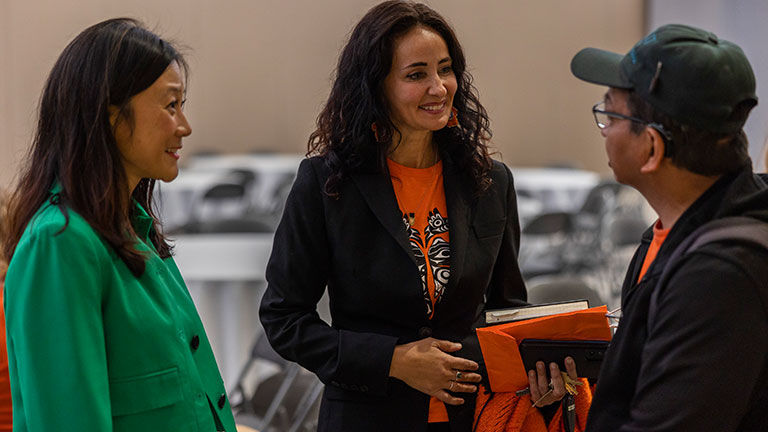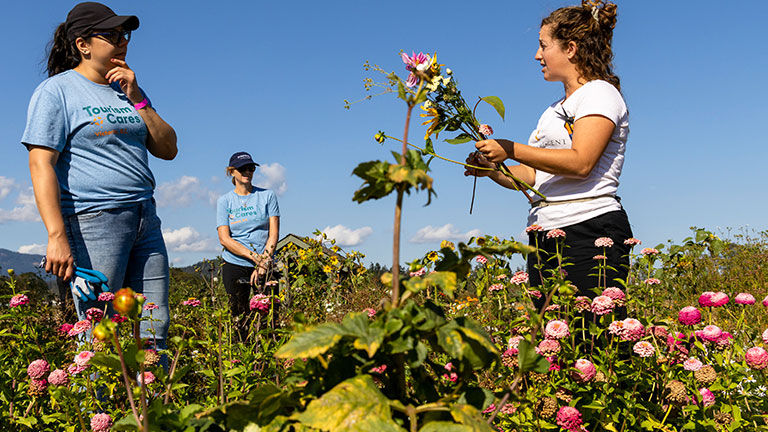While many tourism organizations profess their allegiance to sustainability, responsible practices and destination stewardship, few actually talk the talk and walk the walk as Tourism Cares does.
At the Meaningful Travel Summit, held recently at The Parkside Hotel & Spa in Victoria, British Columbia, I witnessed the convergence of a true spirit of sustainable travel with honest discussions revolving around sensible and practical measures to achieve that end — laid out by 120 attendees representing 78 local and international operators and industry experts.
Established nearly 20 years ago as a nonprofit enabler of myriad travel industry sectors to improve and protect local peoples, their economies and the environment, Tourism Cares has a focused emphasis on making travel a force for good, rather than just a business. Funding is provided via donations by corporate members, private foundations, destination grants and professional memberships.
Attendance at the B2B event was primarily composed of tour operators, sales/marketing executives and destination organizations, and what I observed while attending the various breakout sessions and panel discussions was a refreshingly honest camaraderie among attendees that bore no relation to the brinkmanship and competition that often pervades industry events.
 The Meaningful Travel Summit brought 120 attendees representing 78 operators together.
The Meaningful Travel Summit brought 120 attendees representing 78 operators together.
Credit: 2022 Heath Moffatt PhotoAlso evident was a frank realization that some industry suppliers often get the “tourism cares” part wrong, i.e., by paying lip service to the concept while not actually following through with action, also known as “greenwashing.”
During the “Responsible Hotels and Accommodations” breakout session, panelists discussed strategies for blending business practices with responsible operations, while simultaneously meeting the bottom line. Reducing waste and conserving resources, naturally, was a key discussion point, along with commitments made to eliminate single-use plastics by reverting to refillable bottles and switching to biodegradable, single-use, in-room coffee servings versus the now-familiar coffee pods. There was even brief mention — albeit without much enthusiastic response — of refusing single-night hotel stays in order to reduce laundry frequency.
The middle day of the confab, Experience Day, was designed to both acquaint attendees with local operators and give them the opportunity to roll up their sleeves and pitch in on regenerative agricultural projects or join wildlife/cultural tours. Some opted to clear invasive flora and plant crushed oyster shell hash to promote shellfish presence. Others took a whale watching and wildlife expedition on the Salish Sea with Eagle Wing Tours, which was highlighted by a stop at the ancestral homeland of the Songhees Nation’s people and featured moving, historical commentary by members of that nation’s community.
 Attendees participated in regenerative agricultural projects as part of Experience Day.
Attendees participated in regenerative agricultural projects as part of Experience Day.
Credit: 2022 Heath Moffatt PhotoOne of the summit’s overarching goals was to enhance Tourism Cares’ Meaningful Travel Maps, which the organization continually develops to aid tour operators and travel advisors in finding vetted, authentic community tourism businesses and services for their itineraries. The maps are designed to be the liaison between the travel trade and nonprofit social enterprises to aid in facilitating the hoped-for synergy to ultimately affect a positive impact on all parties through travel.
After all, we, in this industry, are all working together to do the right thing for the people and places of travel. It’s what we do.
And in light of recent revelations about Canada’s dark history regarding the mistreatment of its Indigenous peoples, the Indigenous First Nations Reconciliation program is an ongoing effort that hopes to forge the long road ahead. In fact, Sept. 30, the Summit’s final day, purposefully coincided with Canada’s National Day for Truth and Reconciliation, or Orange Shirt Day, which is set aside to honor the lost children and survivors of the country’s 19th- and 20th-century Indian Residential Schools. Those facilities, only fairly recently officially recognized as a horribly misguided effort to separate Aboriginal children from their cultures, are a stain on Canada’s history which the country is now painfully and honestly coming to grips with.
When I asked Robin Tauck, the organization’s chairman and co-owner of venerable tour and cruise operator Tauck, how Tourism Cares was able to bring together otherwise-fierce business competitors in a collaborative environment, she summed up the organization’s ethos perfectly.
“Its DNA was designed to bring together competitors in a responsibility that we collectively share in protecting the resources that we all depend upon,” she said. “After all, we, in this industry, are all working together to do the right thing for the people and places of travel. It’s what we do.”